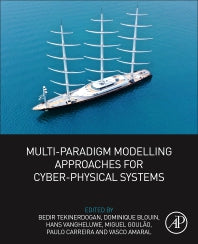Freshly Printed - allow 10 days lead
Couldn't load pickup availability
Multi-Paradigm Modelling Approaches for Cyber-Physical Systems
Explores modeling and analysis in the development of inherently cross-disciplinary cyber-physical systems
Bedir Tekinerdogan (Edited by), Dominique Blouin (Edited by), Hans Vangheluwe (Edited by), Miguel Goulão (Edited by), Paulo Carreira (Edited by), Vasco Amaral (Edited by)
9780128191057, Elsevier Science
Paperback, published 24 November 2020
314 pages, Approx. 100 illustrations
23.4 x 19 x 2 cm, 0.63 kg
Multi-Paradigm Modelling for Cyber-Physical Systems explores modeling and analysis as crucial activities in the development of Cyber-Physical Systems, which are inherently cross-disciplinary in nature and require distinct modeling techniques related to different disciplines, as well as a common background knowledge. This book will serve as a reference for anyone starting in the field of CPS who needs a solid foundation of modeling, including a comprehensive introduction to existing techniques and a clear explanation of their advantages and limitations. This book is aimed at both researchers and practitioners who are interested in various modeling paradigms across computer science and engineering.
1. Introduction Part 1. Ontological framework 2. An ontological foundation for multi-paradigm modelling for cyber-physical Systems 3. A feature-based ontology for cyber-physical systems 4. An ontology for multi-paradigm modelling 5. An integrated ontology for multi-paradigm modelling for cyber-physical Systems Part 2. Methods and tools 6. Enabling composition of cyber-physical systems with the two-hemisphere model-driven approach 7. Multi-paradigm modelling and co-simulation in prototyping a cyber-physical production system 8. Agent-based cyber-physical systemdevelopment with SEA_ML++ 9. CREST – a DSML for hybrid CPSmodelling Part 3. Case studies 10. Development of an IoT and WSN based CPS using MPM approach: a smart fire detection case study 11. Development of industry oriented cross-domain study programs in cyber-physical systems for Belarusian and Ukrainian universities
Subject Areas: Enterprise software [UFL], Technology: general issues [TB], Medical bioinformatics [MBF]


